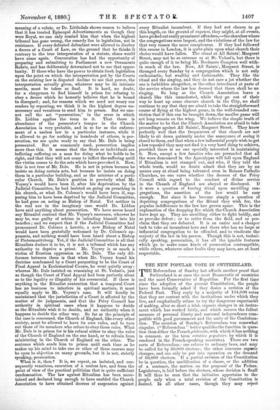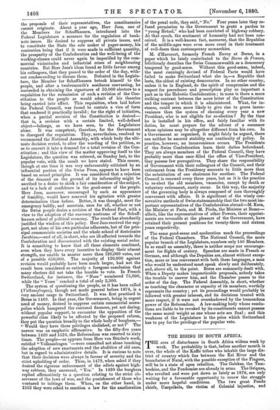THE NEW POPULAR VOTE IN SWITZERLAND.
THE Referendum of Sunday last affords another proof that Switzerland is at once the most Democratic of countries and the most Conservative of Republics. For the first time since the adoption of the present Constitution, the people have been formally asked if they desire a revision of the Federal Pact. They reply by a majority of 134,000 votes that they are content with the institutions under which they live, and emphatically refuse to try the dangerous experiment of making, after so short a trial, organic changes in an instru- ment which has worked fairly, and which assures the fullest measure of personal liberty and cantonal independence com- patible with good government and the unity of the Confedera- tion. The occasion of Sunday's Referendum was somewhat singular. (" Referendum " better qualifies the function in ques- tion than either the French plebiscite, with which it has nothing in common, or the term votation populaire, by which it is rendered in the French-speaking countries). There are two sorts of Referendum : one relates to ordinar7 laws, and may be called for by 30,000 electors ; the other concerns organic changes, and can only be put into operation on the demand of 50,000 electors. If a partial revision of the ConstitUtion be in question, the modification of a clause, or the addition of a sentence, the matter. on the proposal of the Fedora. Legislature, is laid before the electors, whose decision is final It will thus be seen that the initiative appertains to the people only when a total revision of the Constitution is desired. In all other cases, though they may reject
the proposals of their representatives, the constituencies cannot originate. About a year ago, Herr Joos, one of the Members for Schaffhausen, introduced into the Federal Legislature a measure for the regulation of bank- note issues. He desired to suppress all private issues, and to constitute the State the sole maker of paper-money, his contention being that if it were made in sufficient quantity, the prosperity of the Confederation and the well-being of the working-classes could never again be imperilled by the com- mercial vicissitudes and industrial crises of neighbouring countries. But Herr J005'8 ideas found so little favour among his colleagues, that they passed to the order of the day, with- out condescending to discuss them. Defeated in the Legisla- ture, the Member for Schaffhausen betook himself to the people, and after a twelvemonth's assiduous canvassing, he succeeded in obtaining the signatures of 50,000 electors to a requisition for the submission of such a revision of the Con- stitution to the people as would admit of his theories being carried into effect. This requisition, when laid before the Federal Council, was found to contain a vice of form that rendered it practically invalid ; for the right of initiative, when a partial revision of the Constitution is desired— that is, a revision with a certain limited, well-defined object—belongs, as we have seen, to the Legislature alone. It was competent, therefore, for the Government to disregard the requisition. They, nevertheless, resolved to recommend the National Assembly, with which body the ulti- mate decision rested, to alter the wording of the petition, so as to convert it into a demand for a total revision of the Con- stitution ; and this view of the matter approving itself to the Legislature, the question was referred, on Sunday last, to the popular vote, with the result we have stated. This course, though at one time it was very unfavourably criticised by an influential portion of the Swiss Press, appears to have been based on sound principles. It was considered that a rejection of the demand on the ground of its informality might be ascribed to a desire to shirk a fair consideration of the subject, and to a lack of confidence in the good-sense of the people. Herr Joos, moreover, encouraged by such an appearance of timidity, would have renewed his agitation with greater determination than before. Better, it was thought, meet the emergency boldly, and ascertain, once for all, whether or not the Swiss people desire a revision of the Federal Pact, with a view to the adoption of the currency nostrums of the Schaff- hausen school of political economy. The result has abundantly justified the wisdom of this policy. Herr Joos received the sup- port, not alone of his own particular adherents, but of the prin- cipal communistic societies and the whole school of doctrinaire Jacobins,—and of all, in short, who are ill-affected towards the Confederation and discontented with the existing social order. It is something to know that all these elements combined, even when they have every incentive to display their utmost strength, are unable to muster more than 120,000 votes, out of a possible 650,000. The majority of 130,000 against revision would probably have been much larger, had not the result been considered so entirely a foregone conclusion that many electors did not take the trouble to vote. In French Switzerland, for instance, the " Noes " numbered 75,000, while the " Yeses " reached a total of only 3,300.
The system of questioning the people, as it has been called (Volksanfragen), though not made general before 1874, is a very ancient usage in Switzerland. It was first practised in Berne in 1469. In that year, the Government, being in urgent need of money, desired to suppress certain commercial mono- polies which hampered the cantonal finances, yet not daring, without popular support, to encounter the opposition of the powerful class likely to be affected by the proposed reform, they put the question broadly to the whole body of burghers,— "Would they have these privileges abolished, or not ?" The answer was an emphatic affirmative. In the fifty-five years between 1469 and 1524, the Referendum was resorted to sixty times. The people—as appears from Herr von Stiirler's work, entitled " Volksanfragen "—were consulted not alone touching the adoption of new enactments and the abolition of old ones, but in regard to administrative details. It is curious to note that their decisions were always in favour of severity and the strict upholding of order. Thus, in 1479, when asked if they desired the rigorous enforcement of the edicts against high- way robbers, they answered, " Yes." In 1499 the burghers replied affirmatively to a question relating to the strict ob- servance of the laws of war, and the punishment of those who ventured to infringe them. When, on the other hand, in 1513 they were asked to sanction a law for the amelioration of the penal code, they said, "No." Four years later they re- fused permission to .the Government to grant a pardon to " young Hetzel," who had been convicted of highway robbery. At that epoch, the sentiment of humanity had not been con- ceived. It is a well-known fact, moreover, that the Republics of the middle-ages were even more cruel in their treatment of evil-doers than contemporary monarchies.
M. d'Harcourt, formerly French Envoy at Berne, in a paper which he lately contributed to the Revue de France, felicitously describes the Swiss Commonwealth as a democracy tempered by good-sense. Without this good-sense, indeed, the most cunningly devised of Federal Pacts would have failed to make Switzerland what she is,—a Republic that lasts, the oldest of existing democracies. In no other country, unless it be in England, do the spirit of compromise and the respect for precedence and prescription play so important a part as in the Helvetic Confederation ; in none is there a more striking contrast between the mere letter of the Constitution and the temper in which it is administered. What, for in- stance, could seem more likely to give rise to grave incon- venience than the system of choosing every year a new President, who is not eligible for re-election ? By the time he is installed in his office, and fairly familiar with its duties, he must prepare for the advent of a successor whose opinions may be altogether different from his own. In a Government so organised, it might fairly be argued, there can neither be assured stability nor continuity of policy. In practice, however, no inconvenience occurs. The Presidents of the Swiss Confederation learn their duties beforehand. They are always members of the Federal Council, they have probably more than once filled the office of Vice-President, they possess few prerogatives. They share the responsibility of Government with their colleagues of the Council, and their retirement from the Presidency amounts to little more than the substitution of one chairman for another. The Federal Council is renewed every three years, but as it is the practice to re-elect the old members, vacancies, except by death or voluntary retirement, rarely occur. In this way, the majority of the governing body is always composed of men thoroughly conversant with affairs. It is significant of the wisely con- servative methods of Swiss statesmanship that the two most im- portant representatives of the Confederation abroad—M. Kern, the Minister at Paris, and M. Pioda, the Minister at Rome— albeit, like the representatives of other Powers, their appoint- ments are revocable at the pleasure of the Government, have retained their present positions for twenty-three and sixteen years respectively.
The same good-sense and moderation mark the proceedings of the Federal Chambers. The National Council, the more popular branch of the Legislature, numbers only 140 Members. In so small an assembly, there is neither scope nor encourage- ment for flights of oratory. Speeches are made in French or German, and although the Deputies are, almost without excep- tion, more or less conversant with both these languages, a man who would be understood must speak slowly and deliberately, and, above all, to the point. Bores are summarily dealt with. When a Deputy makes impracticable proposals, nobody takes the trouble to answer him, and the Chamber passes to the order of the day. The Federal Assembly, in short, whether as touching the character or capacity of its members, worthily represents the country ; yet its proceedings would probably be followed with greater interest, and its decisions treated with more respect, if it were not overshadowed by the tremendous power of the Referendum. A law-making body whose resolu- tions are liable to be revoked by its constituents cannot possess the same moral weight as one whose acts are final ; and this weakness of the Legislature is the price which Switzerland has to pay for the privilege of the popular veto.



































 Previous page
Previous page